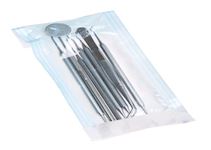Sterile services technician Diploma
Elearn College
Summary
- Certificate of completion - Free
Add to basket or enquire
Overview
Sterile services technicians provide hospital wards and departments with the equipment and materials required for clean, hygienic procedures. Re-useable instruments from wards, clinics and operating theatres are collected, disinfected and checked to make sure they are clean and working properly. Sterile supplies are delivered by trolley, to wards and departments. Sterile services Technicians assemble instruments and supply items such as dressings, needles and syringes in packs or on trays, following standardised procedures. They seal and label the packs or trays, which are then sterilised in steam using machines called autoclaves. Specialised equipment is used to decontaminate or disinfect large items of medical equipment. Most sterile services technicians work at major National Health Service (NHS) hospitals in all parts of the UK. Some work in private hospitals. Others work in health centres and dental practices.
Course media
Description
At present, around 20,000 people work in decontamination services. Vacancies are advertised in the local press, on the NHS jobs website and through Jobcentre Plus offices. Sterile services Technicians work in teams. They are responsible to the manager of the sterile services department (sometimes known as the decontamination service) and are an integral part of the healthcare team. Sterile services technicians generally work 37 hours a week. In larger departments, staff provide services 24 hours a day, seven days a week, which means technicians may be involved in shift work. Part-time work is possible. Departments may be located within hospitals or off-site and may be run by hospital management or by commercial providers. Sterile services Technicians can progress in to assistant management and then service management posts. This sterile services technician course covers areas like infection prevention and control, containment and transportation of reusable medical devices, cleaning and disinfection of equipment, inspection, function testing, assembly and packaging, sterilisation, storage and distribution of equipment.
Syllabus
Unit-1-Overview
Unit 2 Cleaning and Packaging
Unit 3 Sterilization
Unit 4 Quality Management in Sterilizing Services
Unit 5 Thermal and Chemical Disinfection
Who is this course for?
This course would suit for someone who want to work as a sterile services technician in NHS or other health sectors.
Requirements
There are No entry requirements. No background training or qualifications are required. Anyone can enrol at any time, beginners, intermediates and experienced all year round.
Career path
This course will help students to pursue a career in sterile services of healthcare
Questions and answers
Currently there are no Q&As for this course. Be the first to ask a question.
Certificates
Certificate of completion
Digital certificate - Included
Reviews
Legal information
This course is advertised on reed.co.uk by the Course Provider, whose terms and conditions apply. Purchases are made directly from the Course Provider, and as such, content and materials are supplied by the Course Provider directly. Reed is acting as agent and not reseller in relation to this course. Reed's only responsibility is to facilitate your payment for the course. It is your responsibility to review and agree to the Course Provider's terms and conditions and satisfy yourself as to the suitability of the course you intend to purchase. Reed will not have any responsibility for the content of the course and/or associated materials.


